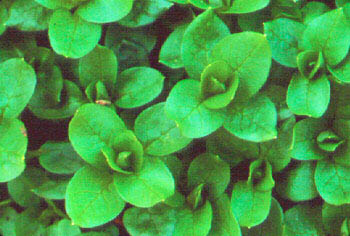 Know
Your Weeds! Know
Your Weeds! |
This week we have a guest columnist - none other than my wife, Ellen. Ellen conceptualized and engineered this web site. She has also constructed many informational bulletins (FYI's). This week Ellen worked on a Weed Bulletin that I think is excellent and certainly worth column space. Next week I'll write a Christmas column and then we will return the first Friday of the New Year. Until next week.
Andy
 Know
Your Weeds! Know
Your Weeds! |
The definition of the word "weed" in the dictionary is as follows: A plant of no value or use. One that tends to overgrow and choke out the more desirable plant. An obnoxious growth.
Weeds are classified
in two categories: Annuals and Perennials.
Annual weeds
- Live for only one year.
Perennial weeds
- Live for two or more years.
Weeds are again categorized
as broadleaf weeds or narrow leaf weeds.
Broadleaf weeds
- flowering weeds.
Grassy weeds
- non flowering weeds - (looks more like a blade of grass).
Weeds produce an abundance of very healthy seeds. The seeds will travel from one place to another in various ways. Animals, birds, rain, wind, equipment, and your clothing can transport seeds to different locations. Did you know that your dog, cat and lawnmower are most likely spreading dandelion seeds from your back yard lawn to your front yard lawn?
Some seeds find a compatible site to germinate quickly. Others will lie dormant and finally appear in a year or two.
View the list and photos
below to familiarize yourself with common weeds that may be plaguing your
lawn and garden. Some weed control suggestions follow.
|
|
|
| Blackmedic (Summer Annual)
Broadleaf Plantain (Perennial) Buckhorn Plantain (Perennial) Curly Dock (Perennial) Wood Sorrel (Oxalis corniculata) (Perennial) Yarrow (Perennial) Dandelion (Biennial) Chickweed (Winter Annual) Henbit (Winter Annual) Knotweed (Summer Annual) Purslane (Summer Annual) Spotted Spurge (Summer Annual) |
Poa annua (Winter Annual)
Yellow Nutsedge (Perennial - From Bulbet - A sedge, not a grass.) Bermudagrass (or Wiregrass) (Perennial - dormant in winter) Smooth Crabgrass (Summer Annual) Dallisgrass (Perennial - dormant in winter) Goosegrass (Annual - germinates in May) |
|
|
|
|
|
|
|
|
|
|
|
|
|
|
 |
|
|
|
|
|
|
|
|
|
|
|
|
|
|
|
 |
|
|
|
|
|
|
|
|
|
|
|
|
|
|
|
|
|
|
|
Weeds will take root more quickly in unhealthy soil. You can deter weed problems by taking some preventative measures.
Selective Post Emergent Herbicide - Kills Targeted Weed - Used to selectively kill perennial weeds in existing crops. Most kill broadleaf plants in grasses. Grass-B-Gon or Ornamec kill grasses in broadleafs. Can kill certain grasses invading other grasses.
Non-Selective Post Emergent Herbicide - Kills ALL Vegetation - Usually has option of planting after a waiting period. RoundUp is great for grasses and small herbaceous plants. Brush-B-Gon is for woody ornamentals.
Soil Sterilants - Complete KILL of roots and vegetation. - Some have no residual, some render the soil sterilant. Pramitol is a salt which kills all vegetation and sterilizes the soil. Steam vapor sterilizes the soil, but has no residual effect. Usually contaminates the soil, so no future growth will occur.
Visit your local garden center, and ask the staff any questions and advice for weed control. They are always glad to assist you.
12/2002
Information:
photos: University of CA
Andy Lynn
Ortho Books